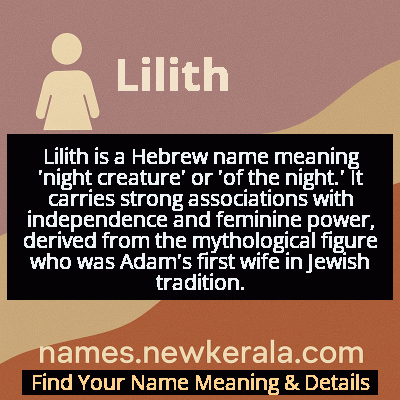Lilith Name Meaning & Details
Origin, Popularity, Numerology Analysis & Name Meaning of Lilith
Discover the origin, meaning, and cultural significance of the name LILITH. Delve into its historical roots and explore the lasting impact it has had on communities and traditions.
Name
Lilith
Gender
Female
Origin
Hebrew
Lucky Number
7
Meaning of the Name - Lilith
Lilith is a Hebrew name meaning 'night creature' or 'of the night.' It carries strong associations with independence and feminine power, derived from the mythological figure who was Adam's first wife in Jewish tradition.
Lilith - Complete Numerology Analysis
Your Numerology Number
Based on Pythagorean Numerology System
Ruling Planet
Neptune (Ketu)
Positive Nature
Intuitive, analytical, spiritual, and inquisitive.
Negative Traits
Secretive, reserved, aloof, and can be overly critical.
Lucky Colours
Green, yellow.
Lucky Days
Monday.
Lucky Stones
Cat’s eye, moonstone.
Harmony Numbers
1, 5, 6.
Best Suited Professions
Scientists, researchers, spiritual leaders, detectives.
What People Like About You
Depth of knowledge, analytical skills, spirituality.
Famous People Named Lilith
Lilith Sternin
Fictional psychiatrist
Complex character in Cheers and Frasier known for professional excellence
Lilith Fair
Music festival
Pioneering all-female music festival promoting women artists
Lilith
Mythological figure
Symbol of female independence in Jewish folklore
Name Variations & International Equivalents
Click on blue names to explore their detailed meanings. Gray names with will be available soon.
Cultural & Historical Significance
Throughout the Middle Ages, Lilith was often demonized in religious texts as a child-killing demon and seductress, reflecting societal fears of independent women. However, the 20th century saw a dramatic reinterpretation of her character, particularly during second-wave feminism when she was reclaimed as a positive symbol of women's liberation. Today, Lilith represents complex themes of empowerment, sexuality, and the reconciliation of light and dark aspects of femininity, making her one of the most dynamically evolving mythological figures in Western culture.
Extended Personality Analysis
Individuals named Lilith typically exhibit strong characteristics of independence, intelligence, and determination. They are often natural leaders who prefer to chart their own course rather than follow established paths, demonstrating remarkable self-reliance and inner strength. This independence is complemented by sharp analytical abilities and a tendency to question authority and conventional thinking, making them innovative problem-solvers who aren't afraid to challenge the status quo.
Liliths often possess an air of mystery and intensity that draws people to them while maintaining a certain emotional reserve. They value authenticity above social approval and have little patience for superficiality or dishonesty. While their strong will can sometimes create challenges in relationships, those who earn their trust find fiercely loyal companions. Their combination of intellectual depth, emotional intensity, and uncompromising integrity makes them powerful forces in both personal and professional contexts, often inspiring others with their courage to live according to their own values.
Modern Usage & Popularity
In contemporary naming practices, Lilith has transformed from a rarely used name with negative connotations to an increasingly popular choice among parents seeking powerful, mythological names with feminist undertones. The name has seen steady growth in popularity since the 1990s, particularly in the United States and United Kingdom, where it now ranks within the top 500 girls' names. Modern usage often emphasizes the name's connection to female empowerment, independence, and mythological richness rather than its historical demonic associations. It appeals particularly to parents interested in gothic, mythological, or unconventional names that carry deep symbolic meaning and a sense of strength and individuality.
Symbolic & Spiritual Meanings
Symbolically, Lilith represents the archetype of the independent feminine spirit that refuses to be subdued or controlled. She embodies the power of saying 'no' to unjust authority and the courage to choose freedom over comfort, making her a potent symbol of personal autonomy and self-determination. The name connects to ancient symbols of night, wisdom, and transformation—often associated with owls, serpents, and the dark moon—representing the hidden knowledge and power that exists outside conventional structures. In psychological terms, Lilith symbolizes the integration of shadow aspects and the reclaiming of denied feminine power, serving as a metaphor for the journey toward wholeness through embracing all parts of oneself, including those society may deem unacceptable.

